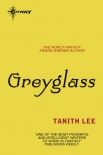Greyglass, Tanith Lee [general ebook reader .txt] 📗

- Author: Tanith Lee
Book online «Greyglass, Tanith Lee [general ebook reader .txt] 📗». Author Tanith Lee
After Patrick, she had had a few brief affairs – they could not be called relationships. She had always liked sex very much, found it easy and rewarding – but beyond the obvious pleasure, unimportant.
It was not that, with R.J., her ultimate pleasure heightened – although she suspected orgasm had changed its aspect – but the act became earth-shatteringly significant. Afterwards she could not stop thinking about what had happened twice in the hotel bed. Just as, from the first, she had not been able to stop thinking about R.J.
They met a couple of times every month, usually Thursdays, sometimes Friday. He lived in Hampshire, and travelling into London could only be managed like this. She wondered how he did manage even this. Presumably his wife, (who Susan knew from the party was called Maria) thought his trips were to do with his writing – jaunts to research, buy books, or visit necessary sites, publishers and agents. Or did she think that? Although never asking him, Susan sensed that perhaps R.J.’s Maria knew where he went, even with whom.
Some people had such arrangements. Didn’t mind it. Did Maria also have somebody else?
The trouble was, R.J. was nothing to do with Maria, or anyone else. He was only to do with Susan.
She knew this was absurd. Incredibly they had their separate lives and did not only come into sentience in each other’s proximity.
Sometimes R.J. could manage a night, even two, away. Then he came to stay with Susan in the latest of her self-contained Lilliputs, the one in Brashspeare Road.
These were holiday times, sometimes even extending through part of a weekend. They would cook meals in the tiny kitchen, eat out at pubs by the river, walk along the towpaths and over the local common. Their lovemaking grew slower and more sensual. They slept back to back. They told each other things about their lives, things about work and inspiration, and self-doubt, and necessary arrogance, their childhoods, people they had known. No one too recent, though. No one who had been a serious lover. Or a wife.
Sunday, if there had been Friday and Saturday, was always the day for parting from R.J., the day he went – home.
She began to dislike Sundays. There was something unwanted that must be done on them, and the next day was… school.
Susan did think about Maria, of course, inevitably, now and then. She didn’t dislike Maria, was not even envious of her. She felt sorry for Maria, in case she was being deceived, and could be made horribly distressed by finding out. And, naturally, she feared Maria, for Maria could perhaps, at a stroke, end the flimsy yet imperishable bond which tied R.J. and Susan together.
Otherwise Susan did not believe their communion would end. It was only a matter of sticking to the rules. Of keeping it quiet, and keeping quiet about certain things to each other, and hoping, without ever voicing it to each other, but hoping for what? Maybe Maria would fall in love with someone else. Or she would die, (she was older than R.J. but not by very much.) Then again Susan steered well clear of the banal viciousness of wishing death to Maria. Besides, R.J. seemed, in his way, to love Maria. On the rare occasions when he mentioned her, (then never intimately) it was gently, fondly, and with respect. And, obviously, accustomedness.
The year passed.
Nothing altered.
They met in London – went to one of the two or three hotels which seemed welcoming, and where falsehoods were no longer offered or expected. Or R.J. came to Brashspeare Road and the kitchen, bathroom and ‘studio’ room woke up and grew bright.
One evening, near Christmas – a solitary strange time always for Susan, led up to by insane parties, socialising, drinking, unreal sentiment, ending in her own Christmas days alone – Susan was making R.J. a private pre-Christmas Christmas Dinner. The turkey was a chicken, but free-range, with stuffing, sprouts, roast potatoes – all tasty things she had learned to cook in the past eleven years, astonished at how easy it was to prepare food simply and well, if not inventively. There were even crackers, in shiny red jackets, and a bottle of Champagne in the fridge.
R.J. said, “I love this, with you.”
Susan said, “Do you?”
“You make it fun,” he said. “New. But you’re young.”
“I’ll be thirty-one next year.”
“As I said, young.”
There in the candlelight, and the smoking scents of cookery, he looked, with his hawk’s eyes, older, so she abruptly saw. His hair had more grey now than dark. His body seemed unchanged, tawny and muscular still from playing football and running in his youth. Yet, didn’t he stoop now, a little?
A shadow of sorrow moved across Susan, as if the bright-lit light had dulled, or the candles, half of them, gone out. He was older than she was. He was the one who might die. One day, not now, but there, there ahead of them.
Susan said, “I wish we could be together. I mean I wish we could live together. Is it ever going to be possible?”
He shook his head. “No.”
They had never had such an exchange before. And yet each of them slipped into it as if practiced – could it be he was?
Susan said, “I mean – wouldn’t you rather be with me? I mean, would you rather? Or does Maria always come first?”
“No one comes first.”
“Which means I don’t.”
“You can’t, Susan. I’m sorry.”
“Does she know about us?” said Susan, drinking the red wine they had already opened to give each other presents by. And by which they now gave each other this.
“Yes,” he said. He was looking away





Comments (0)